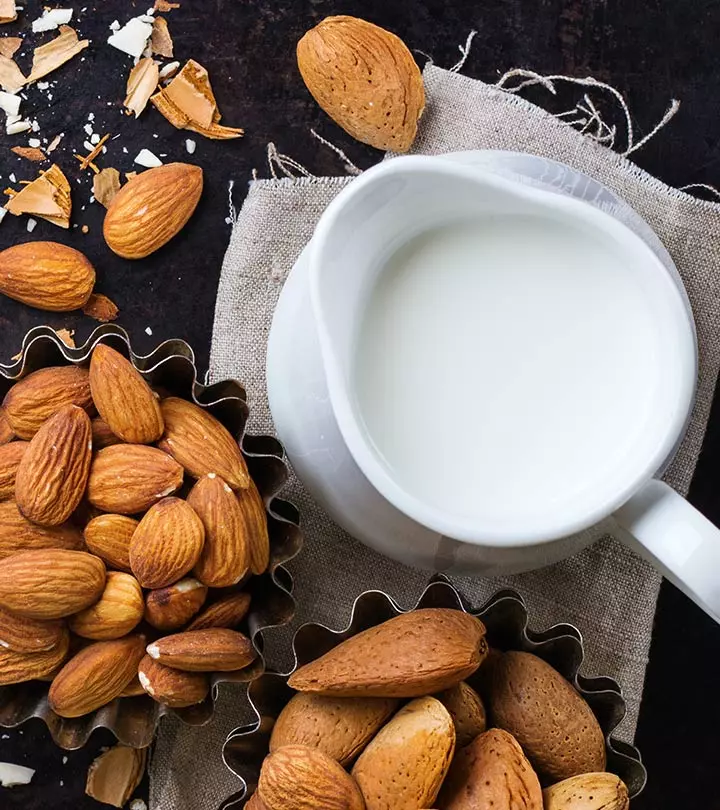Milk Allergy Treatments, Symptoms, And Causes
Know how your body reacts to dairy products and learn the best ways to treat any discomfort.

Image: Shutterstock
Cow’s milk allergy is the most common allergy that affects up to 2.5% of toddlers during the first two years of their life (1). While some infants may grow out of this allergy, some may grow up with milk allergy, leading to intense discomfort and distress. Fortunately, there are a few home remedies for milk allergy treatment you can try to alleviate the symptoms in you or your little one. To get a better understanding of what causes milk allergy, its symptoms, and how to deal with it effectively, read this article for more information.
In This Article
What Is Milk Allergy?
Milk allergy, as the term suggests, is an allergic reaction or response of the body to certain proteins present in milk. Those with milk allergy are often allergic to milk and milk products. This allergy is one of the most common types of food allergies in kids (2).
While cow’s milk is the most common trigger of a milk allergy, even the milk from buffalo, goats, sheep, and other mammals can cause an allergic response. The alpha S1-casein protein that is present in cow’s milk is most often the cause of milk allergies.
The common symptoms associated with a milk allergy are discussed below.
Signs And Symptoms Of Milk Allergy
Children who have a milk allergy often have a slow reaction. They usually begin exhibiting the symptoms over a span of time, which may be several hours or even days later. The symptoms of a milk allergy with a slow reaction that mostly occurs in kids are (3):
- Watery stool, which may contain traces of blood or mucus at times
- Stomach cramps
- Rashes on the skin
- Diarrhea
- Coughing
- Colic, which occurs in babies
- A running nose
- Failure to gain height and weight
- Watery eyes
Some signs and symptoms may develop rather quickly, say in a few seconds to hours. Such symptoms include:
- Hives
- Vomiting
- Nausea
- Wheezing
- An itching sensation around the lips
- Swollen lips, throat, or tongue
In rare cases, a child with a milk allergy may also develop a serious reaction called anaphylactic shock (4). If you notice swelling of the lips, throat, or mouth in your child, it is due to such a reaction. An anaphylactic shock can also cause a drop in blood pressure, breathing difficulties, and may lead to cardiac arrest if prompt treatment is not given.
While a milk allergy may not sound too threatening, it can cause lethal reactions in some kids and adults. As you already know, the primary cause of such allergies is a reaction to one or more proteins found in milk.
To know a little more about the potential factors that could be causing a milk allergy, scroll down.
Causes And Risk Factors For Milk Allergy
Your body’s immune response to some proteins found in milk and milk-containing products is the main cause of a milk allergy. In those with milk allergy, the body identifies some milk proteins as harmful and triggers the production of antibodies called immunoglobulin E (IgE) to neutralize the protein.
Then on, every time you come in contact with the protein, the IgE antibodies identify them and signal your immune system to release histamine and other chemicals. This release results in a range of allergic symptoms (5).
Certain factors can increase your risk of developing this allergy. They include:
- Other existing allergies
- Atopic dermatitis or eczema – This skin condition that causes the skin to become inflamed and itchy and can increase your risk of developing milk allergy as well as other food allergies.
- Family history – Those with a family history of milk allergy or other types of allergies like hay fever, hives, asthma, or eczema are at increased risk of developing the condition (6).
- Shorter breastfeeding periods – It can put infants at a higher risk of developing a milk allergy (6).
- Age – Milk allergy is more common in children than in adults. This is because the digestive system of children is still developing (1).
Now that you are aware of the main triggers of milk allergy and how it occurs, let us move on to the next topic of concern.
Many people tend to confuse milk allergy with lactose intolerance due to the similarity in the symptoms exhibited by both the conditions. However, both are different. How do you know if you have milk allergy or lactose intolerance? Let’s find out.
Milk Allergy Vs. Lactose Intolerance
To know whether you have milk allergy or lactose intolerance, you need to be aware of the major differences between the two (7).
Milk Allergy
- It involves the immune system.
- It is an immune response of the body to some proteins in milk and milk products.
- It leads to the release of histamine and other chemicals that cause allergy symptoms.
- The symptoms can be mild to severe.
- It is more common in children, more so in babies.
Lactose Intolerance
- It involves the digestive system.
- It is caused by the body’s inability to produce lactase, which is an enzyme that is required to digest lactose (a sugar in milk).
- Undigested lactose can move into your colon, where it may be broken down by bacteria and cause symptoms of bloating.
- Its symptoms are uncomfortable but hardly dangerous or severe.
- It is common in adults.
These differences can help you understand if you have milk allergy or lactose intolerance.
If you observe the symptoms of milk allergy in yourself or your child, it is recommended that you see a doctor for diagnosis.
How Do You Test For Milk Allergy?
When something that you ate or drank causes an allergic reaction, it may not be easy to tell what exactly is to blame.
To diagnose a milk allergy, your doctor may start by (8):
- Asking questions about the signs and symptoms
- Performing a physical examination
- Asking you to keep note of the foods you eat
- Asking you to eliminate milk from your diet for a while and then add it back to see if it triggers a reaction
Your doctor may also recommend one or more of the following tests (8):
- Skin test – Your skin is pricked and then exposed to a small amount of milk proteins. Development of a raised bump or hive at the pricked site indicates a milk allergy.
- Blood test – A blood test can help in finding out how your immune system reacts to milk consumption. It does so by measuring the release of IgE antibodies in the blood. However, this test may not be completely accurate in revealing a milk allergy.
Once your condition is diagnosed, your doctor may prescribe treatment accordingly.
How To Treat Milk Allergy
One of the only ways to treat a milk allergy is to avoid the consumption of milk or milk-containing products completely (8). This can be quite difficult as milk is a common ingredient in a lot of foods we consume regularly.
It should also be noted that some individuals who are allergic to milk can tolerate it in other forms – like when milk is heated and added to baked goods or in other forms like yogurt. Talk to your doctor to know what milk products you should avoid.
Other treatments for a milk allergy include (9):
- Antihistamines – Despite your best efforts, if you are unable to curb symptoms of a milk allergy in yourself or your child, you can opt for antihistamine medications.
- Epinephrine Injection – In the event of anaphylaxis or anaphylactic shock, you will need to make a run to the hospital immediately for an emergency injection of epinephrine. Those with an increased risk of such reactions may need to carry injectable epinephrine like EpiPen or Adrenaclick always.
- Coping And Support – Talking to others with a similar allergy not only offers support but may also provide you with some useful tips to battle the condition.
Many milk or dairy products can trigger an allergic reaction similar to what happens when you consume milk. Listed below are some dairy products you should avoid if you have a milk allergy.
What Foods To Avoid If You Are Allergic To Dairy?
Avoid
- Skimmed, whole, and low-fat milk
- Buttermilk
- Yogurt
- Butter
- Gelato and ice cream
- Cheese
- Cottage cheese
Other foods that may be hidden sources of milk are:
- Whey
- Chocolate, nougat, and caramel
- Casein
- Cheese and butter flavorings
- Hydrolysates
- Protein powders
You must also avoid any other dish that may contain dairy products. Whenever you eat out, make it a point to ask about all the ingredients added to the food you are ordering. If you (or your child) are prone to anaphylactic shocks, keep an epinephrine injection with you at all times.
Dairy products are quite sought-after due to their impressive nutrient profile. However, they may not be suitable for those with a milk allergy. Fortunately, there are a number of non-dairy options that may serve as substitutes.
Best Alternatives To Milk Protein
The following are non-dairy options for people with milk allergy:
- Soy protein formula – It is the closest to cow’s milk when it comes to the nutritional profile. It should not be used for infants below 6 months of age, and tolerance to it should be first established before trying it (8).
- Breast milk – Breast milk is the safest alternative to cow’s milk for infants. However, a mother who consumes cow’s milk can transfer the milk proteins to the infant.
- Hypoallergenic formulas – For babies allergic to cow’s milk, extensively hydrolyzed formulas or amino acid formulas that are less likely to cause a reaction are available (8).
Many children, as well as adults, are allergic to certain proteins found in milk from cows, goats, sheep, and buffaloes. The immune system of those who have milk allergy responds to intake of milk or milk products by loading the system with histamines, which in turn produces the reactions. Symptoms of an allergic reaction to milk include rashes, watery loose stools that may or may not contain blood or mucus, coughing, runny nose, watery eyes, nausea, vomiting, wheezing, and swelling of the mouthparts. Milk allergy treatment includes the administration of antihistamines and epinephrine injections. Allergic reactions to milk may be life-threatening, so contact emergency medical services immediately if you notice any sudden or severe symptoms indicative of anaphylactic shock.
Frequently Asked Questions
Can you become allergic to milk all of a sudden?
It is quite unlikely for milk allergy to occur later in life or out of the blue. However, your risk of lactose intolerance can increase with advancing age.
Does milk allergy go away?
Most children can overcome a milk allergy on their own as they grow. However, in those with high levels of cow’s milk antibodies in the blood, the chances of overcoming milk allergy are less likely.
Can you be allergic to milk but not dairy?
Yes, some individuals with milk allergy might be allergic to milk but may not show any reactions to other dairy products like yogurt and heated milk often present in baked goods.
When does milk allergy show up in infants?
Milk allergy can lead to slow reactions in some infants that may take anywhere between a few hours to a few days to show up. Such symptoms usually include stomach cramps, watery stools, or skin rashes. Some symptoms may also show up right after drinking milk. They include hives, wheezing, intermittent coughing, vomiting, etc.
Is ghee safe for those with a milk allergy?
Since ghee has traces of a milk protein called casein, it is best avoided by those with an allergy to casein. However, it is comparatively safe for those who are lactose intolerant.
References
- “Food Allergy” Current Gastroenterology Reports, US National Library Of Medicine.
- “Cow’s milk protein allergy.” Journal of Maternal-Fetal and Neonatal Medicine, US National Library Of Medicine.
- “Approach to milk protein allergy in infants” Canadian Family Physician, US National Library Of Medicine.
- “Anaphylaxis in a milk-allergic child after ingestion of soy formula cross-contaminated with cow’s milk protein.” Pediatrics, US National Library Of Medicine.
- “Cow’s milk allergy: From allergens to new forms of diagnosis, therapy and prevention” Methods, US National Library Of Medicine.
- “Early risk factors for cow’s milk allergy in children in the first year of life.” Allergy and Asthma Proceedings, US National Library Of Medicine.
- “Differentiating milk allergy (IgE and non-IgE mediated) from lactose intolerance: understanding the underlying mechanisms and presentations” British Journal of General Practice, US National Library Of Medicine.
- “Cow’s milk allergy: evidence-based diagnosis and management for the practitioner” European Journal Of Pediatrics, US National Library Of Medicine.
- “Diagnosis and management of food allergy” Canadian Medical Association Journal, US National Library Of Medicine.
Read full bio of Sunni Newman
Read full bio of Shaheen Naser

























Community Experiences
Join the conversation and become a part of our empowering community! Share your stories, experiences, and insights to connect with other beauty, lifestyle, and health enthusiasts.